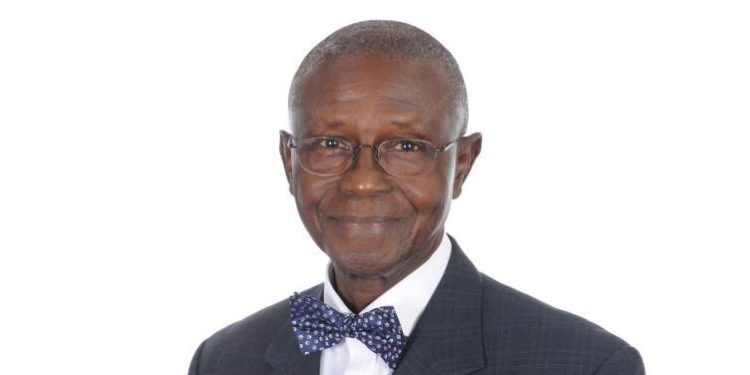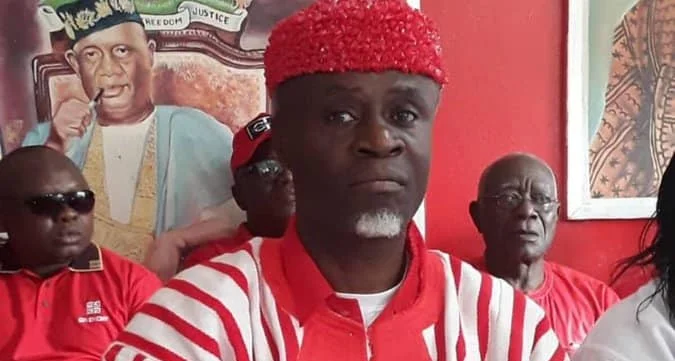By Hon. IB Kargbo- JP, GOOR
James Sampha Koroma, commonly known as Jim, a citizen of Sierra Leone, a native of Yoni Bana in the Tonkolili District, passed on at the Choithram Memorial Hospital on 28th September 2025 in Freetown at age 79.
Jim Sampha Koroma, a household name in Sierra Leone, could be remembered as a man who came to the limelight from his early years in the civil service of Sierra Leone after he graduated with an Economics degree from Fourah Bay College.
The dashing young man was always visibly noticed at the Ministry of Finance, Secretariat Building in the early 70s. He was a well-dressed and popular civil servant, always wearing his trademark bow tie.
Finance minister after Finance minister saw in Sampha Koroma a dedicated public officer who was very knowledgeable about government financial practice and who was also very dedicated to duty and very competitive in nature.
It could be said that of all the Finance Ministers who served at the Ministry of Finance, George Street, the minister who, it was said, mentored him most, was minister Salia Jusu Sheriff, a great politician and chartered accountant.
Salia Jusu Sheriff simply liked Sampha Koroma. “Once Sampha is around, all the other members of staff can go home, I am comfortable,” Salia would confide to visitors. Salia did not only share important information with Sampha but the young officer also actually ran his errands – a neat and lasting relationship between the two.
The relationship between Maada Salia and Jim Sampha Koroma was tight to the extent that the young Sampha was perceived by some as part of the Salia Jusu Sheriff family.
Maada Salia Jusu Sheriff from Kenema in the east of the country mentoring a young man from Tonkolili District in the north of the country, a clear message that Sierra Leoneans could actually mould themselves as one united people, notwithstanding the differences in their district and region of origin.
The well-dressed elegant Sampha, who was also a well-known golfer, and an eloquent English Language speaker, painted the picture of the anglophile Sierra Leonean.
After a spell undertaking academic duties at the University of Syracuse in the United States of America, he returned home to continue to serve his country in the civil service of Sierra Leone.
I was later to pursue a course in journalism at the John Newhouse School of Journalism at the University of Syracuse where I found young American students who had met famous African students at the university; and among such outstanding African students was Jim Sampha Koroma.
His appointment as Managing Director at the National Development Bank (NDB) did not come as a surprise, because according to President JS Momoh, who approved his appointment to that bank, “Sampha is an industrious man who will change the fortunes of that bank for the better.”
Sampha Koroma took to the NDB a new and dynamic administrative savvy that took the bank close to the realm of success. And once again, within a short time, the NDB was back on the brink of resuscitation.
But unfortunately, politics struck the bank when the head of police at the time, James Bambay Kamara, who was determined to expel the Israeli businessman, Skipa, from Sierra Leone, insisted that the bank was equally culpable for merely operating an account that belonged to the Jewish businessman.
Sampha and his close friends would not take any chances, causing him to depart the country at a time when it would have been most unsafe for him to expose his person to the fearsome head of police, James Bambay Kamara. He had not committed any offence, after all.
Sampha Koroma stayed in Accra, Ghana for a while and possibly visited other countries; and I still remember when a young man, whose name I cannot now remember, entered my office at 5 Hanna Benka Coker Street and presented me a sheaf of papers, as he shyly said, “Mr. Koroma wants you to keep these papers for him.”
I naturally looked through the pages, and discovered that they were drafts for the registration of a financial institution, and I quietly kept the papers in one of the drawers of my office desk.
Tonkolili boys, as we used to describe them, were always interested in Economics and banking. There was Sam Bangura, a native of Tonkolili, who studied Economics at the University of Hull in the UK, later to become the Governor of the Bank of Sierra Leone. There was also the case of another Tonkolili boy, Jim Funna, an economist who actually earned a PhD in that discipline and who also later became Governor of the Bank of Sierra Leone; and James Sampha Koroma, who studied Economics and was later appointed Bank Governor of the same bank by President Ahmad Tejan Kabbah. Other Tonkolili economists include Jacob Kanu, Sullay Funna and Bensin Kamara.
Once Dr. Ahmad Tejan Kabbah appointed Sampha Bank Governor, Sampha was quick to give the bank a new look; and his participation at international conferences became very visible, especially during the important period when the possibility of introducing a common West African currency was being discussed throughout the sub-region.
He maintained the all-important Bank of Sierra Leone tradition of openly discussing financial and monetary policies at what was then known as the ‘Governor’s Banquet,’ a tradition that promoted transparency and accountability in the financial management of the economy.
After his departure from the Bank of Sierra Leone, the tradition of the ‘Governor’s Banquet’ disappeared.
But Sampha Koroma’s fame did not blossom as a result of his activities in the public sector alone. He became more famous and visible when he spearheaded the setting up of an indigenous private bank that has over the years competed effectively in the banking sector. The Union Trust Bank (UTB) was widely perceived as ‘Sampha’s bank;’ and why not, for after all, the bank itself was his brainchild.
Today UTB’s presence could be felt throughout the country with branches in most districts of the regions of Sierra Leone.
I remember Sampha Koroma visiting his friends to market his concept for a truly Sierra Leonean private bank; and on one memorable occasion at that time, I found him at the offices of Kan Azzad, the head of the famous Messers. T. Choitram and Sons, marketing his ideas before he set up UTB.
He later returned to participate in public sector activities such as his role as Secretary to the President under President Ernest Bai Koroma, and Chancellor of the University of Sierra Leone, actually replacing President Julius Maada Bio, adding to the pile of an already rich curriculum vitae.
Jim Sampha Koroma’s death shook the nation, a shockwave that spiraled not only within the borders of Sierra Leone but also all over West Africa and other parts of the world.
Jim Sampha Koroma was a great Churchman, a member of the United Methodist, as it is suspected that he might have been influenced and mentored by the great Bishop Thomas S. Bangura, who later became the head of the Church in Sierra Leone.
His numerous friends at the Freetown Golf Club will miss him at that meeting point of ladies and gentlemen of sporting ambition and like minds where Sampha provided social leadership for more than a decade.
Could it be said that Jim Sampha Koroma was ‘apolitical,’ not belonging to any of the political parties in Sierra Leone? And his response to that question was always clear, “I am always one of the foot soldiers prepared to serve any leader who means well for my country.”
Jim Sampha Koroma had as a lifetime partner, the equally industrious Annie Koroma, whom I first met years ago when I was the senior assistant teacher at the St. Andrews Secondary School in Bo, where she had been posted by her university to undertake teaching practice activities. No wonder, in later life, she was rightly perceived as an educationist. A very dedicated housewife, Annie contributed to the success story of Sampha.
I may have lost contact with Sampha Koroma for some time before his passing, but I have always held the view that the man was a great man and a patriotic Sierra Leonean whose history and contribution to the development of Sierra Leone should not be swept under the carpet, as his life and times ought to be celebrated.
May his soul rest in Peace.












